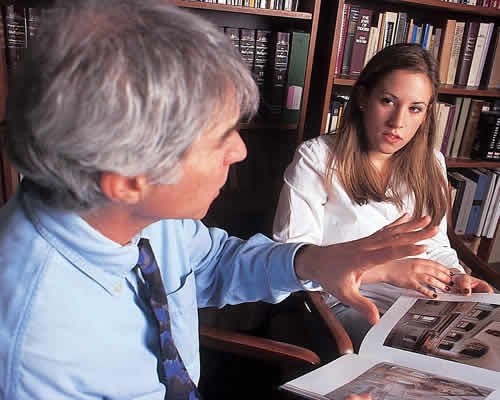“The needs of the present determine and shape collective memory,” says Robert L. Cohn, Philip and Muriel Berman Professor of Jewish Studies and head of the religion department. “Though a nation’s past does not change, what we choose to remember of it shifts continuously.”
“The issue of how we are what we remember interests me greatly,” adds Cohn. “I am intrigued by how groups construct their identities against an “other” and how images of the other, and thus the self, change over time.”
He teaches a course on “Jewish Responses to the Holocaust” in which students study reactions to earlier catastrophes in Jewish history as a basis for understanding how Jews coped with Nazi persecution.
“Students continue to be fascinated by the Holocaust and its ongoing life in public discourse,” Cohn says. Students look at representations of the Holocaust in diaries, memoirs, fiction, comics, and public memorials.
“Memory work is an on-going process,” he notes. “Monuments and museums construct our cultural memory of the Holocaust and its implications for the future.”
As examples, he cites the controversial history of the formation of the United States Holocaust Memorial Museum in Washington, D.C., the revised exhibition at the Auschwitz concentration camp in Poland that better explains that the vast majority of the murdered victims there were Jewish, and the new Holocaust memorial under construction in Berlin, Germany. In each case location, sponsorship, audience, and purpose determine a distinctive representation of the Holocaust.
Switching gears last fall, Cohn taught a First-Year Seminar on Jewish humor. He and his students analyzed jokes to determine why they were funny.
“Though jokes may be funny, the analysis of jokes is serious business,” he chuckles. “Jewish humor is a window into Jewish culture. Humor reveals fault lines in a culture, those issues about which it feels nervous or vulnerable and those traits about which it is proud or embarrassed.”
The class examined the “Jewish-style” humor of Jerry Seinfeld, among others, and attended a comedy club in Manhattan to watch jokes delivered.
“A good joke is like a poem,” he adds. “It is a compact form of expression in which every word counts. Everything must come together for the joke to work. The delivery is the oral dimension of the joke, and timing and repetition are important. It is not enough to say the joke is funny, the question is why is it funny?”
In a new project, Cohn is researching American images of Polish Jews.
“We have this romantic view of the ‘shtetl,’ the Fiddler on the Roof small town as pious and picturesque,” he says, “and through the lens of the Holocaust that world has been seen all the more nostalgically.”
He is researching how images of Polish Jews entered the American Jewish imagination by working in archives and reading the letters of prominent Jewish leaders in the first part of the last century. He will continue this work while on sabbatical next year.
Alumni speak highly of Cohn as a teacher and mentor.
“Prof. Cohn worked with me to create a Jewish Studies major and helped me to arrange my schedule so that I could fit the required courses around those for my mechanical engineering major,” said Heather G. Stoltz ’00, a mechanical engineer helping design a power assist wheelchair at Delta Glide, Hamden, Conn. “Where there were conflicts, he allowed for independent studies, and took the time to be my advisor for many of these independent classes. He pushed me to take my senior capstone project the project further than I had ever imagined it could go. His dedication to his students extends well beyond the classroom. He made the time to meet every week with me and one other student to study the Torah and commentary. These sessions opened my eyes to a world which I will continue studying next year in graduate school at the Jewish Theological Seminary of America in New York City.”
“Prof. Cohn is by far one of my inspirations for pursuing a career in education,” says Todd Toriello ’00, who took two courses with Cohn and earned a master’s degree in English education from Columbia University. Toriello now teaches English at West Morris Central High School, Chester, N.J. “Prof. Cohn is honest, receptive, responsive, compassionate, and open. He is very comfortable with himself and he allows others to be the same. He has grown to be a teacher, a mentor, and a friend. His classroom engendered the highest degree of respect that a college student could feel for a professor. Within a context of challenging and enriching course work, Prof. Cohn had the magic to create a personal comfort zone in which students could always be themselves. He generated a thirst to learn and an invitation to go well beyond course content to develop an understanding of life and the human condition. I could have spent hours in his classroom listening to him lead a class to significant inquiry. His classroom setting is one I will never forget. I can only hope that I, as a teacher, touch my students as Prof. Cohn touched me.”
Highlights
Publications:2 Kings, Studies in Hebrew Narrative and Poetry, The Liturgical Press, 2000; The Shape of Sacred Space: Four Biblical Studies, Scholars Press, 1981; co-editor with Laurence Silberstein, The Other in Jewish Thought and History, New York University Press, 1994. John Carmody, Denise Carmody and Robert Cohn, Exploring the Hebrew Bible, Prentice-Hall, 1988.
Honors: Philip and Muriel Berman Scholar, 1987-1993, Philip and Muriel Berman Chair, 1993-present, first American Jewish Committee scholar to lecture at Roman Catholic seminaries in Poland, 1993; Thomas Roy and Lura Forrest Jones Award for superior teaching and scholarship, 2000.
Achievements: Head, Department of Religion, 1996-present; member, Pennsylvania Humanities Council board of directors, 2001-present; Jewish Publication Society Editorial Committee.
Contact: (610) 330-5182; cohnr@lafayette.edu

A National Leader in Undergraduate Research. Alexandra Pelberg ’02 made a presentation on research she did under the guidance of Robert Cohn, professor of religious studies, at the National Conference on Undergraduate Research.
